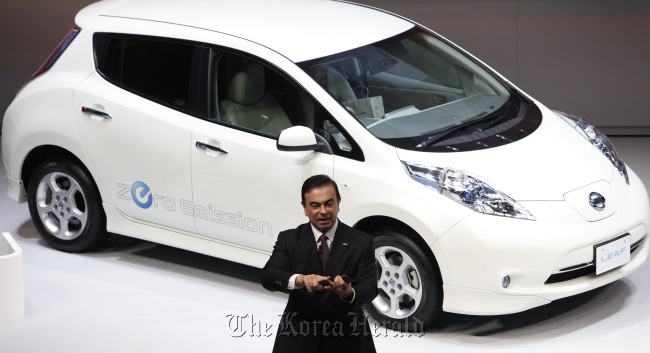Carlos Ghosn laid a $5 billion bet in 2009 that the world’s next Ford Model T would be electric, and that Nissan Motor Co. would lead a revolution embraced by nations such as Denmark. Three years later, sales of Leaf plug- in vehicles in the Nordic country: 73.
Nissan’s chief executive officer has long fronted a campaign to convince the world that by the end of the decade, 1 in 10 cars sold will be electric. Customers haven’t bought in, as prices remain high and charging stations are few and far between. Sales for 2012 were half their target in the U.S.
Ghosn’s response has been to double down. Last week, he put his chief operating officer directly in charge of electric cars, elevating the Leaf’s importance for the future of Japan’s second-biggest carmaker. With Nissan sales falling short in the U.S. and China, some investors say they’d prefer the CEO focus on more immediate concerns.
Nissan’s chief executive officer has long fronted a campaign to convince the world that by the end of the decade, 1 in 10 cars sold will be electric. Customers haven’t bought in, as prices remain high and charging stations are few and far between. Sales for 2012 were half their target in the U.S.
Ghosn’s response has been to double down. Last week, he put his chief operating officer directly in charge of electric cars, elevating the Leaf’s importance for the future of Japan’s second-biggest carmaker. With Nissan sales falling short in the U.S. and China, some investors say they’d prefer the CEO focus on more immediate concerns.

“When we see this situation of Nissan missing targets in several markets, the atmosphere of trust has begun to deteriorate a little,” said Takashi Aoki, a Tokyo-based fund manager at Mizuho Asset Management Co. “As long as Ghosn meets profit targets, investors won’t fret.”
While Ghosn, 59, still gets the benefit of the doubt from asset managers such as Aoki, such creeping concerns are an adjustment for a man credited with turning Nissan from near bankruptcy in 1999 into the world’s most profitable major carmaker five years later. Ghosn’s management acumen won him offers to run General Motors and Ford Motor Co. ― and a starring role in a comic book that sold 300,000 copies in Japan.
Today, Nissan’s flagship Altima has been overtaken by Honda Motor Co.’s Accord as the second-best selling midsize sedan in the U.S. Deliveries in China ― Nissan’s biggest car market ― are shrinking amid a lingering backlash against Japanese brands caused by a territorial dispute.
Then there’s the Leaf, whose development is being pushed ahead amid sputtering demand. Days after putting COO Toshiyuki Shiga in charge of electric vehicles, a branch of China’s top economic planning agency said Nissan and its local partner plan to build an electric-vehicle plant able to make 50,000 units a year by 2015, as many as Nissan does in its Leaf factory in Japan today. Nissan declined to make executives available to comment for this story.
Like Ghosn, China has grand ambitions for electric cars, targeting 500,000 EVs and plug-in hybrid vehicles to be on its roads by mid-decade and 5 million by 2020. There are now 27,800 ― about 80 percent of which are public buses. Lately, some of China’s top policy makers are having doubts. The nation’s industry minister this month said the government should consider backing more conventional technologies, such as gasoline- electric hybrids.
While interpretations of recent government comments are speculative, “what is clear is that the Chinese government has set impressive goals,” Nissan said in an e-mail.
Ghosn, who’s also CEO of Renault SA, didn’t immediately aim for the biggest markets with electric cars. In 2009, he singled out Denmark, Israel and Portugal as markets populated by consumers concerned about the environment, and with infrastructure that could be adapted to the needs of electric motoring. They’re also small enough to suit the restricted driving range of all-electric vehicles.
“Our electric vehicles are a breakthrough because they are designed to be mass marketed,” Ghosn said in Frankfurt that year, discussing the 4 billion euros ($5.2 billion) Nissan and Renault would commit to invest in the technology. “This will bring environmental soundness at a price everyone can afford.”
As the European Union’s debt crisis and the U.S. economy’s struggle to escape recession pinched budgets, countries like Denmark haven’t responded to Ghosn’s zeal with the investment in infrastructure needed to stoke consumer interest.
Prices remain high. According to Nissan’s U.S. website, a Leaf starts from $21,300 after federal tax rebates, comparable to the price of an Altima, which is roomier and has 70 percent more horsepower. In Denmark, Nissan’s site advertises a leaf for just over 268,000 krone, or more than $46,400.
Nissan’s 73 Leafs sold in the country compare to 170,770 new-car registrations last year.
“It seems way too early for mass production for electric vehicles,” said Ben Williams, a London-based fund manager at GAM (U.K.) Ltd., who oversees about $300 million in Japanese equities. “The infrastructure globally isn’t in place. The range issues still concern consumers.”
In his crusade, Ghosn has presented former Pope Benedict with a plug-in ‘Popemobile’ at his summer residence in Castel Gandolfo outside Rome and driven onstage in a Leaf at a Yokohama presentation with Former Japanese Prime Minister Junichiro Koizumi in the passenger seat.
Regular drivers remain largely unconverted ― including those who would like to be.
Take Tokuhiro Shibato. The Tokyo veterinarian was so keen to make the switch from gasoline that he hired a Leaf once a month for more than a year to try it out. He and his wife liked the car, especially the silence of the electric motor that fostered family chats.
What put them off was finding recharging stations. On a 600-kilometer journey from Tokyo, Shibato made sure he knew where to plug in along the way. He forgot to check when the stations closed.
Driving back at night, the alert system warned him he wouldn’t make it home at his current power usage. He slowed to 50 kilometers an hour, the lowest speed allowed on the freeway.
“It took me hours to get home,” Shibato said.
They eventually bought a Daihatsu Hijet minivan that runs on compressed natural gas.
Shibato’s not alone. Industry researcher IHS expects battery-powered cars to claim about 1 percent of global production in 2020, while rival research firm J.D. Power & Associates puts it at below 2 percent.
Ghosn has given himself leeway in the past, saying that even 5 percent penetration would be a success, and that bullish early targets reflected “passion” for the product rather than “arrogance.”
Last month, Ghosn said earnings in the latest quarter missed company expectations as sales fell in China and deliveries missed expectations in the U.S.
“They need to show how they’re going to focus,” said Yuuki Sakurai, the president of Fukoku Capital Management Inc., which manages about $17 billion in Tokyo. “It’s hard to work out which region Nissan is focusing on.”
According to Bloomberg New Energy Finance, worldwide sales of all electric cars ― including plug-in hybrids ― more than doubled to 119,300 last year, though that was about a third of industry expectations. The Leaf was outsold by GM’s Volt and a plug-in version of Toyota Motor Corp (7203).’s Prius, both of which have gasoline motors for the kind of problems faced by Shibato.
Those concerns have yet to dent Nissan shares, which have risen since mid-November, when Prime Minister Shinzo Abe began a campaign to talk down the value of Japan’s currency to revive the nation’s export-led economy. The yen has since tumbled 16 percent against the dollar.
Over the same period, Nissan shares have climbed about 43 percent to their highest levels since early 2008. And while the gains trail those of Toyota and Honda, the advance ensures Ghosn retains the goodwill of investors.
“I think he has done a remarkable job turning Nissan around,” said Williams at GAM. “The yen wasn’t his fault, and the China issue wasn’t his fault. Possibly the only thing Ghosn did wrong is the EV.”
(Bloomberg)
-
Articles by Korea Herald












![[Weekender] How DDP emerged as an icon of Seoul](http://res.heraldm.com/phpwas/restmb_idxmake.php?idx=644&simg=/content/image/2024/04/25/20240425050915_0.jpg&u=)







